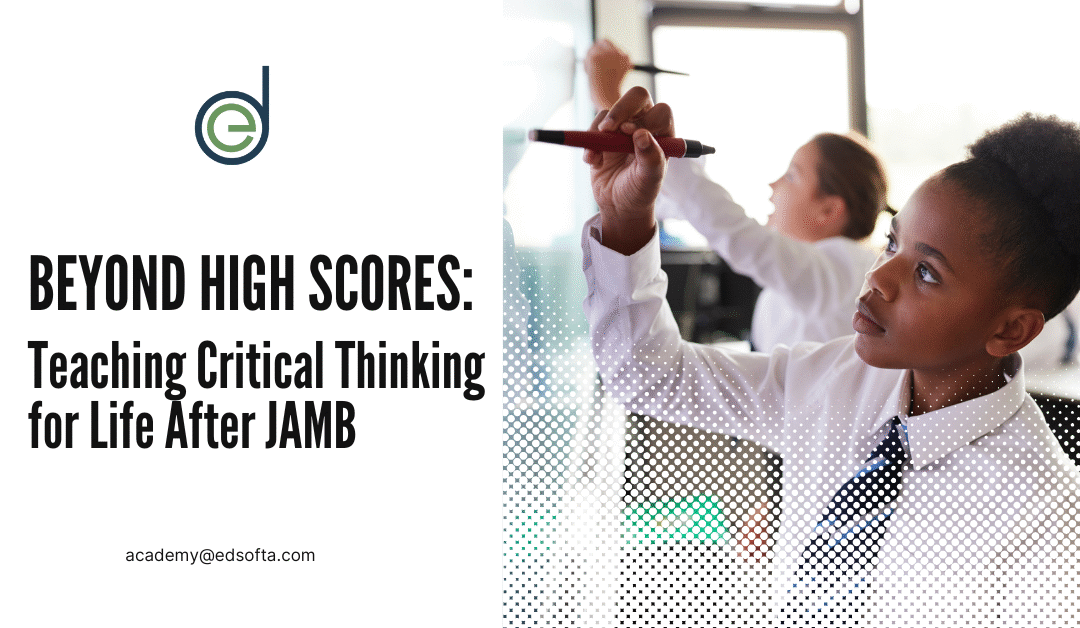Introduction: Are You Preparing Your Students for Life?
Every year, thousands of students across Nigeria pour their energy into preparing for the JAMB UTME. And while a high score is certainly worth celebrating, there’s a bigger question school owners and JAMB centre operators need to ask:
Are our students prepared for life beyond the exam hall?
In our rush to drill formulas and memorise theories, we sometimes overlook the skills that matter just as much—if not more—in the real world: critical thinking, emotional intelligence, and practical decision-making.
Now is the time to shift from cramming to cultivating thinking minds. Let’s explore how.
Why Critical Thinking Matters More Than Ever
The truth is, students will face real-world decisions the moment the UTME results are out. For example, a student may score 270 and still worry about securing a spot in a competitive course like Medicine. Another may have options but no clear direction.
Without critical thinking skills, these students are left confused, even with stellar results.
As educators and centre managers, we can offer more than academic coaching. We can equip students to evaluate, reflect, and act wisely in unfamiliar situations.
1. Ask Better Questions to Get Better Thinking

Let’s start in the classroom. We often ask questions with one right answer. But what if we encouraged students to think instead of just recall?
For instance, rather than asking, “What’s your career goal?” try: “Why is this goal important to you? What challenges might you face, and how would you overcome them?”
Open-ended questions like these push students beyond surface-level answers. They develop reasoning and self-awareness, both of which are essential for thriving in and outside of school.
Classroom Tip: During a career guidance session, ask students to share their dream careers—then go deeper with follow-up “why” and “how” questions.
2. Use Real-Life Scenarios to Build Emotional Intelligence

Theory meets reality when students are faced with tough choices. Let’s use that to our advantage.
Take this example:
A student scores 270 in the UTME and dreams of studying Medicine. But they’re unsure if that score will be enough.
You could ask:
- “What are their options?”
- “Should they wait a year or explore another course?”
- “How can they manage expectations from family?”
Scenarios like this help students explore options, understand consequences, and empathise with different perspectives.
Pro Tip: Use the EdSofta app to simulate decision-making scenarios and get students thinking about real-life dilemmas before they encounter them.
3. Teach Research as a Life Skill, Not Just an Exam Tool

Google alone won’t save them. Students need to know how to find, verify, and evaluate information.
Introduce research tasks like:
- Comparing courses and universities on JAMB CAPS
- Exploring job outlooks using platforms like LinkedIn or Jobberman
- Verifying scholarship opportunities through official websites
This builds independence and prepares them for the digital demands of university life.
Bonus Tip: Assign small group projects using the EdSofta app’s research module. Let students explore current educational and career data and present their findings to peers.
4. Career Exploration: Let Students Dream… and Then Do the Work

Another effective way to build critical thinking is through career exploration tasks.
Here’s how: Ask each student to choose a career they’re interested in. Then have them research:
- The roles and responsibilities
- Required UTME subjects
- Universities in Nigeria that offer the course
- Relevant skills and salary expectations
Finally, let them present their findings. This gives them ownership of their learning and encourages them to connect their dreams with practical steps.
This approach teaches students to be curious, proactive, and informed—core traits of critical thinkers.
5. Encourage Collaboration Through Group Discussions

The ability to think critically isn’t just individual—it’s also social. When students exchange ideas, argue respectfully, and learn from each other, they grow in confidence and communication.
Organise class debates or group presentations. Ask them to argue both sides of thought-provoking topics like:
- “Is it better to study abroad or stay in Nigeria?”
- “Should social media be allowed in schools?”
- “Which is better: private or public universities?”
After the debate, have them reflect: Did their opinions change? What did they learn from their peers?
Practical Integration: Use EdSofta to facilitate virtual or hybrid group debates and assessments.
Final Thoughts: Think Beyond the Exam
At EdSofta, we believe education must prepare students not just for exams, but for life. As a school owner or JAMB centre operator, you are perfectly positioned to make this shift.
By blending UTME prep with real-life skills, you help students thrive, not just score. From using the EdSofta app’s interactive tools to guiding thoughtful conversations, your influence extends far beyond the four walls of the classroom.
So, let’s ask better questions. Simulate real-life decisions. Guide research and teamwork. Let’s raise a generation that doesn’t just pass—but progresses.
Ready to help your students become thinkers, not just test-takers?
Explore EdSofta’s tools designed for school owners and UTME centres.
✅ Assign research tasks
✅ Host group activities
✅ Track progress in real-time
Email us at academy@edsofta.com to get started today!



